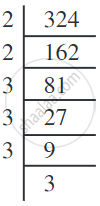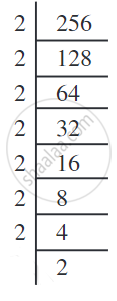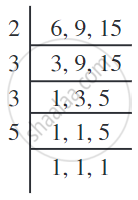Topics
Rational Numbers
- Rational Numbers
- Closure Property of Rational Numbers
- Commutative Property of Rational Numbers
- Associative Property of Rational Numbers
- Distributive Property of Multiplication Over Addition for Rational Numbers
- Identity of Addition and Multiplication of Rational Numbers
- Negative Or Additive Inverse of Rational Numbers
- Concept of Reciprocal or Multiplicative Inverse
- Rational Numbers on a Number Line
- Rational Numbers Between Two Rational Numbers
Linear Equations in One Variable
- Variable of Equation
- Concept of Equation
- Expressions with Variables
- Balancing an Equation
- The Solution of an Equation
- Linear Equation in One Variable
- Solving Equations Which Have Linear Expressions on One Side and Numbers on the Other Side
- Some Applications Solving Equations Which Have Linear Expressions on One Side and Numbers on the Other Side
- Solving Equations Having the Variable on Both Sides
- Some More Applications on the Basis of Solving Equations Having the Variable on Both Sides
- Reducing Equations to Simpler Form
- Equations Reducible to the Linear Form
Understanding Quadrilaterals
- Concept of Curves
- Different Types of Curves - Closed Curve, Open Curve, Simple Curve.
- Concept of Polygons
- Classification of Polygons
- Properties of a Quadrilateral
- Interior Angles of a Polygon
- Exterior Angles of a Polygon and Its Property
- Concept of Quadrilaterals
- Properties of Trapezium
- Properties of Kite
- Properties of a Parallelogram
- Properties of Rhombus
- Property: The Opposite Sides of a Parallelogram Are of Equal Length.
- Property: The Opposite Angles of a Parallelogram Are of Equal Measure.
- Property: The adjacent angles in a parallelogram are supplementary.
- Property: The diagonals of a parallelogram bisect each other. (at the point of their intersection)
- Property: The diagonals of a rhombus are perpendicular bisectors of one another.
- Property: The Diagonals of a Rectangle Are of Equal Length.
- Properties of Rectangle
- Properties of a Square
- Property: The diagonals of a square are perpendicular bisectors of each other.
Practical Geometry
- Introduction to Geometric Tool
- Constructing a Quadrilateral When the Lengths of Four Sides and a Diagonal Are Given
- Constructing a Quadrilateral When Two Diagonals and Three Sides Are Given
- Constructing a Quadrilateral When Two Adjacent Sides and Three Angles Are Known
- Constructing a Quadrilateral When Three Sides and Two Included Angles Are Given
- Some Special Cases
Data Handling
- Concept of Data Handling
- Interpretation of a Pictograph
- Interpretation of Bar Graphs
- Drawing a Bar Graph
- Interpretation of a Double Bar Graph
- Drawing a Double Bar Graph
- Organisation of Data
- Frequency Distribution Table
- Graphical Representation of Data as Histograms
- Concept of Pie Graph (Or a Circle-graph)
- Interpretation of Pie Diagram
- Chance and Probability - Chance
- Basic Ideas of Probability
Squares and Square Roots
- Concept of Square Number
- Properties of Square Numbers
- Some More Interesting Patterns of Square Number
- Finding the Square of a Number
- Concept of Square Roots
- Finding Square Root Through Repeated Subtraction
- Finding Square Root Through Prime Factorisation
- Finding Square Root by Division Method
- Square Root of Decimal Numbers
- Estimating Square Root
Cubes and Cube Roots
Comparing Quantities
- Concept of Ratio
- Basic Concept of Percentage
- Increase Or Decrease as Percent
- Concept of Discount
- Estimation in Percentages
- Basic Concepts of Profit and Loss
- Sales Tax, Value Added Tax, and Good and Services Tax
- Calculation of Interest
- Concept of Compound Interest
- Deducing a Formula for Compound Interest
- Rate Compounded Annually Or Half Yearly (Semi Annually)
- Applications of Compound Interest Formula
Algebraic Expressions and Identities
- Algebraic Expressions
- Terms, Factors and Coefficients of Expression
- Types of Algebraic Expressions as Monomials, Binomials, Trinomials, and Polynomials
- Like and Unlike Terms
- Addition of Algebraic Expressions
- Subtraction of Algebraic Expressions
- Multiplication of Algebraic Expressions
- Multiplying Monomial by Monomials
- Multiplying a Monomial by a Binomial
- Multiplying a Monomial by a Trinomial
- Multiplying a Binomial by a Binomial
- Multiplying a Binomial by a Trinomial
- Concept of Identity
- Expansion of (a + b)2 = a2 + 2ab + b2
- Expansion of (a - b)2 = a2 - 2ab + b2
- Expansion of (a + b)(a - b) = a2-b2
- Expansion of (x + a)(x + b)
Mensuration
Visualizing Solid Shapes
Exponents and Powers
Direct and Inverse Proportions
Factorization
- Factors and Multiples
- Factorising Algebraic Expressions
- Factorisation by Taking Out Common Factors
- Factorisation by Regrouping Terms
- Factorisation Using Identities
- Factors of the Form (x + a)(x + b)
- Dividing a Monomial by a Monomial
- Dividing a Polynomial by a Monomial
- Dividing a Polynomial by a Polynomial
- Concept of Find the Error
Introduction to Graphs
- Concept of Bar Graph
- Interpretation of Bar Graphs
- Drawing a Bar Graph
- Concept of Double Bar Graph
- Interpretation of a Double Bar Graph
- Drawing a Double Bar Graph
- Concept of Pie Graph (Or a Circle-graph)
- Graphical Representation of Data as Histograms
- Concept of a Line Graph
- Linear Graphs
- Some Application of Linear Graphs
Playing with Numbers
Notes
Finding Square Root Through Prime Factorisation:
Consider the prime factorisation of the following numbers and their squares.
| Prime factorisation of a Number | Prime factorisation of its Square |
| 6 = 2 × 3 | 36 = 2 × 2 × 3 × 3 |
| 8 = 2 × 2 × 2 | 64 = 2 × 2 × 2 × 2 × 2 × 2 |
| 12 = 2 × 2 × 3 | 144 = 2 × 2 × 2 × 2 × 3 × 3 |
| 15 = 3 × 5 | 225 = 3 × 3 × 5 × 5 |
You will find that each prime factor in the prime factorisation of the square of a number, occurs twice the number of times it occurs in the prime factorisation of the number itself.
1) Find the square root of 324?

By pairing the prime factors, we get
324 = 2 × 2 × 3 × 3 × 3 × 3
= 22 × 32 × 32
= (2 × 3 × 3)2
So, `sqrt(324)` = 2 × 3 × 3 = 18.
2) Find the square root of 256?

Prime factorisation of 256 is
256 = 2 × 2 × 2 × 2 × 2 × 2 × 2 × 2
By pairing the prime factors we get,
256 = 2 × 2 × 2 × 2 × 2 × 2 × 2 × 2
= (2 × 2 × 2 × 2)2
Therefore,
`sqrt(256)` = 2 × 2 × 2 × 2 = 16
Example
Find the square root of 6400.

6400 = 2 × 2 × 2 × 2 × 2 × 2 × 2 × 2 × 5 × 5
Therefore, `sqrt(6400)` = 2 × 2 × 2 × 2 × 5 = 80.
Example
Is 90 a perfect square?

90 = 2 × 3 × 3 × 5
The prime factors 2 and 5 do not occur in pairs.
Therefore, 90 is not a perfect square.
That 90 is not a perfect square can also be seen from the fact that it has only one zero.
Example
Is 2352 a perfect square? If not, find the smallest multiple of 2352 which is a perfect square. Find the square root of the new number.

We have 2352 = 2 × 2 × 2 × 2 × 3 × 7 × 7
As the prime factor 3 has no pair, 2352 is not a perfect square.
If 3 gets a pair then the number will become perfect square. So, we multiply 2352 by 3 to get,
2352 × 3 = 2 × 2 × 2 × 2 × 3 × 3 × 7 × 7
Now each prime factor is in a pair.
Therefore, 2352 × 3 = 7056 is a perfect square.
Thus the required smallest multiple of 2352 is 7056 which is a perfect square.
And, `sqrt(7056)` = 2 × 2 × 3 × 7 = 84.
Example
Find the smallest square number which is divisible by each of the numbers 6, 9, and 15.

The least number divisible by each one of 6, 9, and 15 is their LCM.
The LCM of 6, 9 and 15 is 2 × 3 × 3 × 5 = 90.
Prime factorisation of 90 is 90 = 2 × 3 × 3 × 5.
The prime factors 2 and 5 are not in pairs. Therefore 90 is not a perfect square.
In order to get a perfect square, each factor of 90 must be paired. So we need to
make pairs of 2 and 5. Therefore, 90 should be multiplied by 2 × 5, i.e., 10.
Hence, the required square number is 90 × 10 = 900.
If you would like to contribute notes or other learning material, please submit them using the button below.
Shaalaa.com | Finding Square Roots through The Prime Factorisation
to track your progress
Series: Finding Square Roots through The Prime Factorisation
0%
